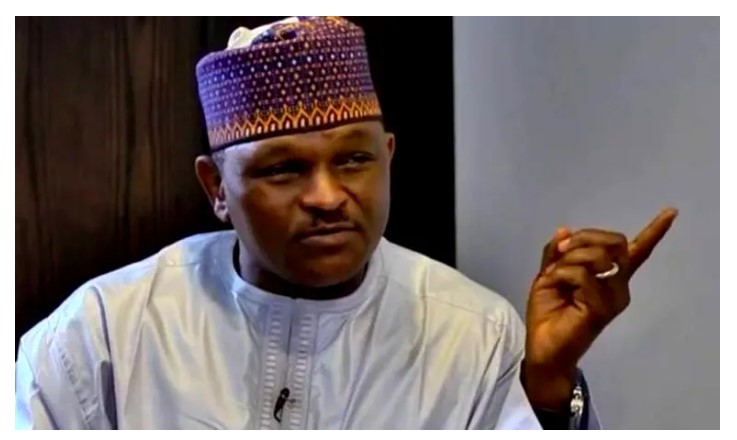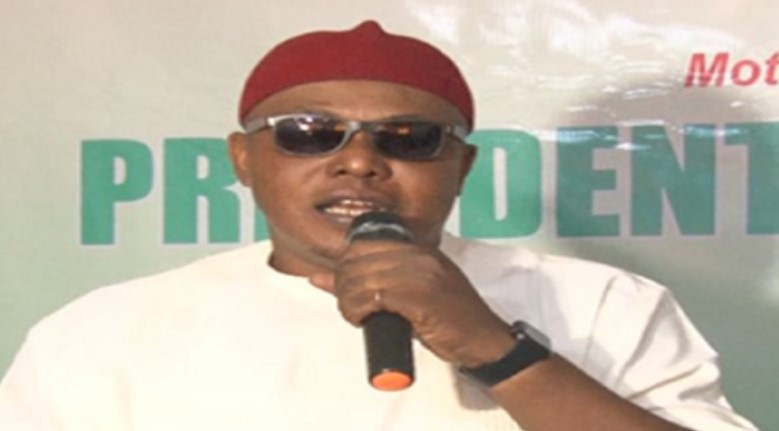With the 2023 presidential election campaigns in full swing in Nigeria, many presidential hopefuls are gaining visibility by making themselves more available to be interviewed by local and international media. One of those people is the presidential hopeful for the Action Alliance party, making themselves mHamza Al-Mustapha.
Mustapha was a former chief security officer to the former military dictator of Nigeria, General Sani Abacha. He is not without controversy. He was known for his role in the human rights abuses and corruption that took place during the Abacha regime in the 1990s. He has also been accused of involvement in the assassination of Kudirat Abiola, a prominent Nigerian Human Rights activist and wife of the imprisoned opposition leader Moshood Abiola who also died under mysterious circumstances.
Hamza al-Mustapha has faced multiple criminal charges in Nigeria related to these allegations and has spent time in prison. However, he has consistently denied any wrongdoing and maintains his innocence.
APPEARANCE ON BEREKETE FAMILY RADIO
On the 8th of November, 2022., Hamza gave an extended and explosive interview on the Berekete Family Radio Station, Abuja. Based on his pedigree both as a former, top-ranking military officer and as a former Chief Security Officer of the nation, the details in his revealing interview, are not to be dismissed lightly. We will be looking at some of his starting revelations.
Al Mustapha alleges that the “powers that be” at the helm of controlling international affairs in order to protect their own interest have controlled the production and distribution of Nigeria’s crude oil since its discovery in 1956. He says the administration of past years like Nnamdi Azikiwe and Tafawa Balewa was abnormally brought to an end because they refused to accept the terms of not exporting crude oil and only importing refined products.
He claims that the reasons/excuses for the coup d’etats in Nigeria contained historical literature and were taught by generations and generations are lies. According to him, there is a conspiracy to keep Nigeria impoverished and unstable by preventing it from building its own refineries and exporting petroleum products.
He refers to petroleum subsidy as a game and says not one of the eighteen presidential candidates in Nigeria can overcome it as it is a challenge to political parties and institutions. He advocates for a roundtable discussion for all the national leaders past and present to find a permanent solution to this critical issue and lift Nigeria out of economic paralysis.
He gives several examples of countries all over the world that stabilised their economies after leaders deliberated and implemented transformational strategies that changed their nations forever. Some of his examples were the United Kingdom in 12:15, using diplomacy and military might conquer, colonise and make itself a world power. France in 1714, and later the United States opened their borders to allow immigrants then fighting indigenes to become another world power.
He goes on to mention Japan after the attack in Hiroshima, deliberating and negotiating then becoming stronger to fight China. Mao Zedong’s revolution and China’s realisation that skill acquisition would be their way out, embracing unison and becoming the world’s largest market. He says the latest examples are countries like Singapore and Malaysia that applied their own love of their country to advance their nations.
Al Mustapha says Nigeria needs real restructuring and in his own words, restructuring is a direct consumption of a doctrine that will build your country where everybody will participate, and where social justice is. It will be all-encompassing and the law of the land is upon everybody.
NIGERIA’S TWO CLASSES AND DIRTY OIL POLITICS
The former Chief Security quite aptly described Nigeria as having two classes; those above the law and the poor below the law and goes further to discuss what he postulates as the history of oil dirty politics in Nigeria. He describes it as international dirty oil politics and domestic dirty oil politics in Nigeria.
Further describing international dirty oil politics, Al Mustapha explains it as the role of the international oil companies being utilized by foreign countries who have invested in Nigeria’s oil and bringing governments into power in order to puppeteer them into doing the bidding of these foreign forces. He then starts giving instances of where previous administrations were toppled over for reasons which were unknown to the public, their refusal to give into the demands of international dirty oil politics.
AZIKIWE, BALEWA AND GOWON
Hamza Al Mustapha is of the opinion that leaders like Late Nnamdi Azikiwe and Tafawa Balewa deserve t be immortalised because they were victims of a conspiracy to ensure that refineries were never built or commissioned for the benefit of Nigerians. The same fate was suffered by their predecessors like Aguiyi Ironsi.
He says Yakubu Gowon’s act of building three refineries in Port Harcourt, Warri and Kaduna, angered foreign forces and marked him down for the same fate as his predecessors. Gowon further increased tension when he publicly said “with the three refineries we have just come up with we shall build five more to be able to make sure that there is an adequate supply of oil and all the by-products to the people, enough to themselves to do businesses and to live”.
Al Mustapha says from then on Gowon’s government started facing false allegations of corruption and became short-lived so these five refineries that he planned could not come to fruition and he was eventually toppled over.
He says Nigeria has the capacity to be amongst the first ten richest countries in the world.
MURTALA, SHAGARI, BUHARI AND BABANGIDA
Murtala Mohammed resolved to commission the three refineries built by his predecessors and construct the five additional refineries conceived by Gowon, six months after, Murtala was killed in a coup.
Mustapha says that from 1976 to 1979, nobody touched oil projects and no single Refinery was commissioned but oil theft was rife. However, in 1977, Festac was a distraction to usher in a new mode of oil theft in form of allocations and domestic bunkering
When Shehu Shagari came to power in 1979, after meeting with Adisa Akinloye, Chairman of NPN, Obafemi Awolowo, leader of Yoruba Elders Council and Adeniran Ogunsanya, Chairman of NPP, he commissioned the three refineries. Allegations of corruption began to mar his regime and it came to an end through a coup led by Muhammadu Buhari.
Buhari refused to devalue the naira which was stronger than even the dollar. This was a prerequisite to the foreign unseen hands and his tenure was shortlived.
In 1972, when gas was discovered in abundance then they were more determined to keep Nigeria under bondage. Some professors have researched this and gathered more information.
BUHARI AND JONATHAN
He attributes Buhari IMF and World Bank challenges as well as Babangida’s eventual establishment of the People’s Bank and Structural Adjustment Programme (SAP) as measures to address the economic issues caused by the influence of foreign hands.
As of 1993, Al Mustapha says the types of oil bunkering occurring in Nigeria were up to seven. He said that unregistered ships are regularly coming to cater away Nigeria’s oil and enrich themselves while the nation keeps borrowing loans. Several patriotic citizens have lost their lives and their jobs trying to expose the activities of illegal bunkering He gives an instance of how a security alert about Boko Haram was released immediately after the discovery of one of these ships was made public in order to distract the nation from the issue.
Abacha took over from Buhari and Al Mustapha says his establishment of the Economic Council, creation of LNG, Vision 2010, PTF, and plan for dredging ruffled feathers. Al Mustapha personally discussed a situation where he worked with an MD of one of the oil companies to unravel inflated contracts with non-existent components and colossal amounts for turnaround maintenance of the refineries which were submitted for presidential approval. The amounts requested for turnaround maintenance were enough to establish new refineries. These were schemes to keep continually keep the country impoverished and unable to manage the oil it has in abundance.
.
Al Mustapha says that the introduction of petroleum subsidy by Goodluck Jonathan’s tenure spurred the total halt of production in the refineries, full importation of oil and additional types of bunkering plus oil theft in thousands. Al Mustapha said Ngozi Okonjo-Iweala’s resolve as Minister of Finance to resolve the problems of the nation’s treasury looting was the genesis of huge problems for her including her mother’s kidnap in 2012.
According to him, the elites involved are taking money to promote subsidy. Seven years after Buhari’s resolve to stop subsidy, he is still unable to.
More oil is being discovered in Northeast Nigeria, and already, investments are being made for another type of bunkering on land.
Nigeria needs a leadership that cares, will carry them along, educate them and create a barrier from the monster and managers of the monster locally and internationally.
He describes North Eastern Nigeria as the richest part of Africa. That the Southeast is not just rich in oil and gas, coal and other precious stones but gold in red sand deposits which are currently carted away in enormous quantities by Chinese companies fraudulently claiming they are refining it for fertillizer and doing so uninhibited by Nigeria’s customs and immigration.
CONCLUSION
Al Hamza’s interview is undeniably perturbing. It is loaded with information that should cause anyone Nigerian to be alarmed about the depletion of the oil resources of the nation to the detriment of its impoverished citizenry. The unquestioned and unchecked continual plundering of Nigeria’s oil and other mineral resources from its discovery till date after successive military and civilian governments is an anomaly only comparable to the occurrences in the Democratic Republic of Congo where citizens live under $2 a day despite having arguably the world’s richest deposits of natural resources including raw minerals.
The question is whether Al Mustapha is the person qualified to lead Nigeria in a presidential capacity to resolve this situation. His experience in military intelligence is unquestionable. He appears well-informed about the security anomalies within and across Nigeria’s borders. His knowledge can’t be dismissed with a wave of the hand.
On the other hand, his role in probably the most brutal military dictatorship ever witnessed in the history of Nigeria. The antecedents of the Abacha regime still leave a sour taste in the mouths of Nigerians. Al Mustapha’s abuse of office and history of human rights abuses during his tenure cannot be denied. He also makes no apology for working with Abacha.
Looting under the Abacha regime is probably one of the most highly documented in the Nation’s history to date. A whopping $3.65 billion has been recovered more than two and a half decades after his death. His family and cohorts still live in opulence and enjoy tremendous amounts of loyalty from many of the nation’s powerful and influential people. This a strong indicator that much more of this loot may never be recovered.
Al Mustapha himself has vehemently denied involvement in any form of looting but are onlookers truly convinced? It would not be farfetched if his presidential aspiration is seen as an extension of the Abacha regime.
Again, Al Mustapha’s interview seems to attribute every single wrongdoing of all of Nigeria’s past leaders to the influence of “foreign hands”.He did not attribute any single leader’s misgiving to personal incompetence and never for once did he demand accountability for any of their actions that negatively impacted the welfare of Nigeria’s citizenry. If indeed we agree that foreign influence made Nigeria’s leaders incompetent and derailed Nigeria’s progress, did they also cause Nigeria’s leaders to turn the Central Bank of Nigeria into a personal purse and loot the nation’s treasury? Did the foreign hands make Nigeria’s past and present leaders kill maim and torture enemies while seeking personal vendetta? Did these foreign hands make Nigeria’s past leaders completely incapable of allocating huge contracts for infrastructure across the nation on basis of nepotism and not incompetence?
Were the foreign hands responsible for the non-rehabilitation and outright negligence of Nigeria’s institution for decades to the brink of collapse? Were these foreign hands responsible for total the neglect of the health sector and encouraging our leaders, their families and associates to seek healthcare in the best in US, UK, Europe, and the Middle East? Were the foreign hands so strong that it made our leaders totally ignore the educational sector and opt to send their children to the most expensive private institutions in the world while school children in Nigeria languished in dilapidated structures and teachers from primary to tertiary institutions remained unpaid for years and months?
The examples are endless and it is unfortunate Al Mustapha turns a blind eye to all these instead of addressing the aspect of personal accountability. A few leaders at all levels of governance in Nigeria displayed integrity across their own sectors. Al Mustapha himself mentioned Ngozi Okonjo-Iweala. Dora Akunyili’s contribution to drug regulation and Bart Nnaji’s effort in power generation were prominent examples. These public officers stood their ground, turned a blind eye to corruption, did not abuse their offices and made the Nigerian citizens proud of their contributions. They are historic examples that Nigerian leaders could have done better.
Nigerians seem to be on the lookout for a leader who has absolutely no ties to past leaders with a history of endemic corruption. If the 2023 elections are free and fair, the polls will eventually reflect his acceptance by the Nigerian citizenry.




